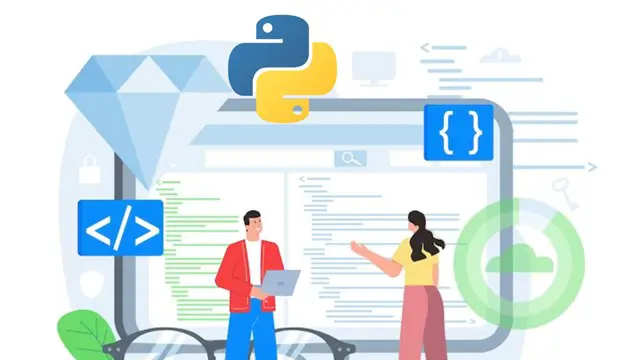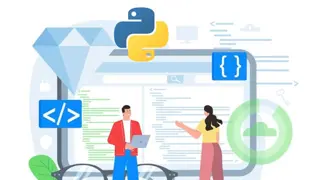
Python Programming (beginner to expert)
Self-paced videos, Lifetime access, Study material, Certification prep, Technical support, Course Completion Certificate
Uplatz
Summary
- Reed courses certificate of completion - Free
- Uplatz Certificate of Completion - Free
Add to basket or enquire
Overview
Uplatz offers this comprehensive course on Python programming language. It is a self-paced course with video lectures. You will be awarded Course Completion Certificate at the end of the course.
Python is a general-purpose programming language used in web development, data science and also for creating software prototypes.
Python was created by Guido van Rossum, and released in 1991. It is a very simple and easy to use programming language and a must-know for individuals who want to excel in the field of web development and Data Science. It is a very simple yet powerful programming language which makes it even easier for beginners to learn the Python Programming language.
Python presents itself using data structures such as listing, dictionaries, strings and standard operations including sorting, mapping, concatenation and slicing. It supports Object-Oriented Programming paradigms and its class model supports polymorphism, operator overloading, and multiple inheritances.
Curriculum
Course media
Description
Python Programming - Course Syllabus
Introduction to Python Programming
What is Python Programming?
History of Python Programming
Features of Python Programming
Why to learn Python Programming
Application of Python Programming
Setup of Python Programming
Getting Python
Installation of Python
Getting started with the first Python program
Running the first Python Program
Variables and Data Types
What is a variable?
Declaration of variable
Variable assignment
Data types in Python
Checking Data type
Data types Conversion
Python programs for Variables and Data Types
Python Identifiers, Keywords, Reading Input, Output Formatting
What is an Identifier?
Keywords
Reading Input
Taking multiple inputs from user
Output Formatting
Python end parameter
Operators in Python
Operators and types of operators
a) Arithmetic Operators
b) Relational Operators
c) Assignment Operators
d) Logical Operators
e) Membership Operators
f) Identity Operators
g) Bitwise Operators
Python programs for all types of operators
Decision Making
Introduction to Decision making
Types of decision-making statements
Introduction, syntax, flowchart and programs for
a) if statement
b) if…else statement
c) elif statement
Loops
Introduction to loops
Types of loops
a) for loop
b) while loop
c) infinite loop
d) nested loop
Break, continue and pass statement
Python programs for all types of loops
Numbers
Number Type Conversion
Random Number Functions
Trigonometric Functions
Mathematical Constants
Strings
Accessing Values in Strings
Updating Strings
String Special Operators
Built-in String Methods
Lists
Python Lists
Accessing Values in Lists
Updating Lists
Deleting List Elements
Basic List Operations
Built-in List Functions and Methods
Tuples
Accessing Values in Tuples
Updating Tuples
Deleting Tuple Elements
Basic Tuples Operations
Built-in Tuple Functions
Difference between list and tuple
Dictionary
Accessing Values in Dictionary
Updating Dictionary
Delete Dictionary Elements
Properties of Dictionary Keys
Built-in Dictionary Functions and Methods
Date and Time
What is Tick?
What is TimeTuple?
Getting Current Time
Getting Formatted Time
Getting Calendar for a Month
Functions
Defining a Function
Calling a Function
Passing by Reference versus Passing by Value
Ways to write function
Types of functions
Anonymous function
Recursive Function
Modules
What is a module?
Creating a module
The import Statement
The ‘from’ import Statement
Renaming a module
Using the dir() function
The ‘from’ import * Statement
Locating Modules
Files I/O
Printing to the Screen
Opening and Closing Files
The open Function
The file Object Attributes
The close() Method
Reading and Writing Files
The write() Method
The read() Method
More Operations on Files
Exceptions
What is Exception?
Handling an Exception
The except Clause with No Exceptions
The except Clause with Multiple Exceptions
The try-finally Clause
List of Standard Exception
Raising an Exception
Argument of an Exception
Classes and Objects
What is an Object?
What is a Class?
Creating a Class
Creating an object
Self in Python
__init__ method
Examples
Regular Expression
What is a Regular Expression?
Metacharacters
match() function
search() function
re match() vs re search()
findall() function
split() function
sub() function
GUI Programming
What is a GUI Programming?
Tkinter Programming
Tkinter Widgets
Building Your First Python GUI program with Tkinter
Who is this course for?
Everyone
Requirements
Passion and determination to achieve your goals!
Career path
- Python Developer
- Software Engineer - Python / R / C++
- Software Developer
- Machine Learning Engineer
- Data Analyst
- Data Scientist
- Data Engineer
- Analyst/Programmer - Python, SQL
- Cloud Engineer - Python, R
- Application Developer
- Deep Learning Engineer
- Python Engineer
- Python Backend Engineer
- Lead Principle Python Developer
- Python GUI Engineer
- Python Developer - Django/API
- Lead/Senior Programmer
- Team Lead
Questions and answers
Currently there are no Q&As for this course. Be the first to ask a question.
Certificates
Reed courses certificate of completion
Digital certificate - Included
Will be downloadable when all lectures have been completed
Uplatz Certificate of Completion
Digital certificate - Included
Course Completion Certificate by Uplatz
Reviews
Currently there are no reviews for this course. Be the first to leave a review.
Legal information
This course is advertised on reed.co.uk by the Course Provider, whose terms and conditions apply. Purchases are made directly from the Course Provider, and as such, content and materials are supplied by the Course Provider directly. Reed is acting as agent and not reseller in relation to this course. Reed's only responsibility is to facilitate your payment for the course. It is your responsibility to review and agree to the Course Provider's terms and conditions and satisfy yourself as to the suitability of the course you intend to purchase. Reed will not have any responsibility for the content of the course and/or associated materials.


